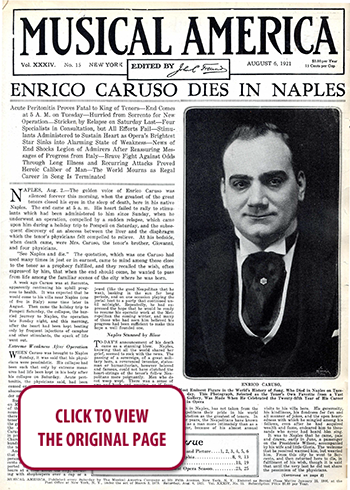 100 YEARS AGO IN MUSICAL AMERICA (407)
100 YEARS AGO IN MUSICAL AMERICA (407)
August 6, 1921
Page 1
ENRICO CARUSO DIES IN NAPLES
Acute Peritonitis Proves Fatal to King of Tenors—End Comes at 5 A.M. on Tuesday—Hurried from Sorrento for New Operation—Stricken by Relapse on Saturday Last—Four Specialists in Consultation, but All Efforts Fail—Stimulants Administered to Sustain Heart as Opera’s Brightest Star Sinks into Alarming State of Weakness—News of End Shocks Legion of Admirers After Reassuring Messages of Progress from Italy—Brave Fight Against Odds Through Long Illness and Recurring Attacks Proved Heroic Caliber of Man—The World Mourns as Regal Career in Song Is Terminated
NAPLES, Aug. 2. —The golden voice of Enrico Caruso was silenced forever this morning, when the greatest of the great tenors closed his eyes in the sleep of death, here in his native Naples. The end came at 5 a. m. His heart failed to rally to stimulants which had been administered to him since Sunday, when he underwent an operation, compelled by a sudden relapse, which came upon him during a holiday trip to Pompeii on Saturday, and the subsequent discovery of an abscess between the liver and the diaphragm which the tenor’s physicians felt compelled to relieve. At his bedside, when death came, were Mrs. Caruso, the tenor’s brother, Giovanni, and four physicians.
“See Naples and die.” The quotation, which was one Caruso had used many times in jest or in earnest, came to mind among those close to the tenor as a prophecy fulfilled, and they recalled the wish, often expressed by him, that when the end should come, he wanted to pass from life among the familiar scenes of the city where he was born. A week ago Caruso was at Sorrento, apparently continuing his uphill progress to health. It was expected that he would come to his villa near Naples (one of five in Italy) some time later in August. Then came the holiday trip to Pompeii Saturday, the collapse, the hurried journey to Naples, the operation late Sunday night, and this morning, after the heart had been kept beating only by frequent injections of camphor and other stimulants, the spark of life went out.
Extreme Weakness After Operation WHEN Caruso was brought to Naples Sunday, it was said that his physicians were pessimistic. His collapse had been such that only by extreme measures had life been kept in his body after his collapse on Saturday. Acute peritonitis, the physicians said, had been caused or was attended by a subphrenic abscess, and the only hope, a very slender one, lay in an immediate operation.
Such weakness of the heart followed on Monday that Professor de Soto, one of the medical men in attendance, announced after a consultation that there was no hope of prolonging the tenor’s life beyond Tuesday. Word of the great singer’s danger spread through the city and crowds gathered about Caruso’s retreat, many persons kneeling in prayer . Tourists asked for bulletins. Churches and shrines were visited by hundreds who offered supplications for the tenor’s recovery.
Among those who refused to believe that Caruso was at death’s door were persons who had been with him in Sorrento only a week or so ago. They reported that Caruso had walked for hours at a time about the city, bartering with shopkeepers over a cap or a jewel (like the good Neapolitan that he was), basking in the sun for long periods, and on one occasion playing the jovial host to a party that continued until midnight. Repeatedly, he had expressed the hope that he would be ready to resume his operatic work at the Metropolitan the coming winter, and many of those who had seen him believed his progress had been sufficient to make this hope a well founded one.
Naples Stunned by Blow
TO-DAY’S announcement of his death came as a stunning blow. Naples, knowing that all the world shared her grief, seemed to rock with the news. The passing of a sovereign, of a great military hero, a reverenced inventor, statesman or humanitarian, however beloved and famous, could not have clutched the heart-strings of the tenor’s fellow Neapolitans more poignantly. Men who do not weep wept. There was a sense of awe and hush and groping, as if from inability to understand how this life could have been taken away.
Though Caruso had not sung much in Italy for many years, Naples regarded him as her most illustrious son. The city will take official recognition of this fact, and will accord the tenor’s memory such honors as few citizens ever have received. The fact that most of his triumphs have been abroad, and that his voice is more familiar in New York than in Naples, has not taken from the Neapolitans their pride in his world reputation as the greatest of tenors. In later years, the Neapolitans have known him as a man more intimately than as a singer, because of his almost annual visits to his villa here. His generosity, his kindliness, his fondness for fun and all manner of jokes, and the open heartedness with which he mingled among his fellows, even after he had · acquired wealth and fame, endeared him to thousands who never had heard him sing.
It was to Naples that he came, pale and drawn, early in June, a passenger on the Presidente Wilson, accompanied by his wife and little Gloria. The welcome that he received warmed him, but wearied him. From this city he went to Sorrento, and then returned here to die, in fulfilment of his wish, though it is said that until the very last he did not share the pessimism of the physicians.




 RENT A PHOTO
RENT A PHOTO





